
Dame Thora Hird was an English actress. In a career spanning over 70 years, she appeared in more than 100 films, as well as many television roles, becoming a household name and a British institution.

Sir John Mills was an English actor who appeared in more than 120 films in a career spanning seven decades. He excelled on camera as an appealing British everyman who often portrayed guileless, wounded war heroes. In 1971, he received the Academy Award for Best Supporting Actor for his performance in Ryan's Daughter.

William Thomson Hay was an English comedian who wrote and acted in a schoolmaster sketch that later transferred to the screen, where he also played other authority figures with comic failings. His film Oh, Mr. Porter! (1937), made by Gainsborough Pictures, is often cited as the supreme British-produced film-comedy, and in 1938 he was the third highest-grossing star in the UK. Many comedians have acknowledged him as a major influence. Hay was also a keen amateur astronomer.
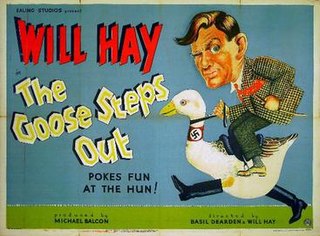
The Goose Steps Out is a British film released in 1942, starring Will Hay, who also co-directed with Basil Dearden. It is a comedy of mistaken identity, with Hay acting as a German spy and also an Englishman who is his double. It was the film debut of Peter Ustinov.
Royston Clarke is an English comedy writer best known for creating the sitcoms Last of the Summer Wine, Keeping Up Appearances, Open All Hours and its sequel series, Still Open All Hours.

Ralph Douglas Vladimir Slocombe OBE, BSC, ASC, GBCT was a British cinematographer, particularly known for his work at Ealing Studios in the 1940s and 1950s, as well as the first three Indiana Jones films. He won BAFTA Awards in 1964, 1975, and 1979, and was nominated for the Academy Award for Best Cinematography on three occasions.
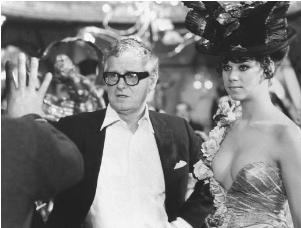
Basil Dearden was an English film director.

Jamaica Inn is a 1939 British adventure thriller film directed by Alfred Hitchcock and adapted from Daphne du Maurier's 1936 novel of the same name. It is the first of three of du Maurier's works that Hitchcock adapted. It stars Charles Laughton and Maureen O'Hara in her first major screen role. It is the last film Hitchcock made in the United Kingdom before he moved to the United States.
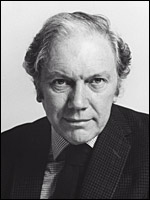
Michael Leighton George Relph was an English film producer, art director, screenwriter and film director. He was the son of actor George Relph.
Christopher Winton Beeny was an English actor and dancer. He had a career as a child actor, but was best known for his work as the footman Edward Barnes on the 1970s television series Upstairs, Downstairs, as Billy Henshaw in the sitcom In Loving Memory, and as the incompetent debt collector and golfer Morton Beamish in Last of the Summer Wine.
John Gervase Dighton was a British playwright and screenwriter.

The Next of Kin, also known as Next of Kin, is a 1942 Second World War propaganda film produced by Ealing Studios. The film was originally commissioned by the British War Office as a training film to promote the government message that "Careless talk costs lives". After being taken on by Ealing Studios, the project was expanded and given a successful commercial release. After the war and up until at least the mid 1960s, services in British Commonwealth countries continued to use The Next of Kin as part of security training. The film's title is derived from the phrase "the next of kin have been informed" as used by radio announcers when reporting on the loss of personnel in action.
Arthur Crabtree was a British cinematographer and film director. He directed films with comedians such as Will Hay, the Crazy Gang and Arthur Askey and several of the Gainsborough Melodramas.
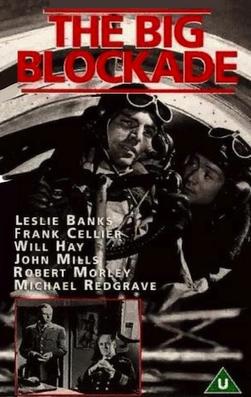
The Big Blockade was a 1942 British black-and-white war propaganda film in the style of dramatised documentary. It was directed by Charles Frend and starred Will Hay, Leslie Banks, Michael Redgrave and John Mills. It was produced by Michael Balcon for Ealing Studios, in collaboration with the Ministry of Economic Warfare.
Go to Blazes is a short 1942 British information film, produced by the Ministry of Information, directed by Walter Forde and starring Will Hay and Thora Hird.

The Halfway House is a 1944 British drama film directed by Basil Dearden and starring Mervyn Johns, his daughter Glynis Johns, Tom Walls and Françoise Rosay. The film tells the story of ten people who are drawn to stay in an old Welsh countryside inn. Location scenes were shot at Barlynch Priory on the Devon/Somerset border.

Ronald Alfred Shiner was a British stand-up comedian and comedy actor whose career encompassed film, West End theatre and music hall.

Something Money Can't Buy is a 1952 British comedy drama film directed by Pat Jackson and starring Patricia Roc, Anthony Steel and Moira Lister. The film was made with backing from the NFFC as part of its British Film-Makers project with the Rank Organisation. The film was distributed by Rank's General Film Distributors. In America it was released by Universal Pictures in 1953.

The Magnet is a 1950 British comedy film directed by Charles Frend and starring Stephen Murray, Kay Walsh, and in his first starring role James Fox. A young Wallasey boy obtains a magnet by deception, leading to much confusion. When he is acclaimed as a hero, he is shamed by his own sense of guilt.
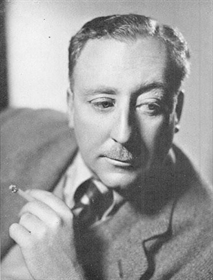
Joss Ambler was an Australian-born British film and television actor. He usually played somewhat pompous and irascible figures of authority, particularly in comedy films. He was an effective foil to George Formby in both Trouble Brewing and Come On George!, and similarly to Will Hay in The Black Sheep of Whitehall,.














